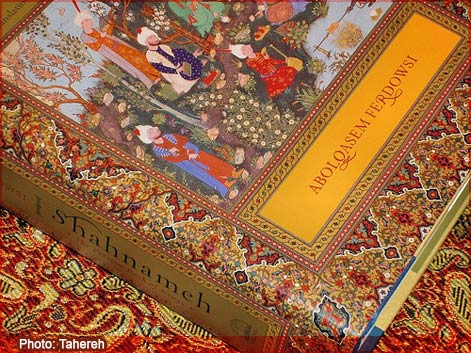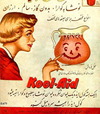Ferdowsi's Shahkar
by ARASH KARAMI
29 Mar 2010 14:527 Comments
 How does one begin an article about the greatest poet in Iranian history? One stumbles along, sadly, helplessly, pathetically, attempting to sound profound and insightful, giving the poet his due respect while simultaneously expressing his opinion with the cold and rational eye of an experienced critic who has properly distanced himself from his subject, and then, inevitably, one fails. Fails because there is no proper introduction that doesn't fall short for the poet who so distinctly changed Iran 1,000 years ago. So I won't even attempt but an informal overview.
How does one begin an article about the greatest poet in Iranian history? One stumbles along, sadly, helplessly, pathetically, attempting to sound profound and insightful, giving the poet his due respect while simultaneously expressing his opinion with the cold and rational eye of an experienced critic who has properly distanced himself from his subject, and then, inevitably, one fails. Fails because there is no proper introduction that doesn't fall short for the poet who so distinctly changed Iran 1,000 years ago. So I won't even attempt but an informal overview.
If you've never heard of Ferdowsi, and if like me you are an Iranian-American born after the revolution, having immigrated to this country at a young age with your parents, then pick up his epic masterpiece, which is probably on a shelf in your parents' living room. It is that untouched Bible-sized volume stranded next to Hafez. If the difficult language does not overwhelm you, then God bless you, and how much do you charge to tutor? Otherwise, you can buy Rick Davis' translation of Abolqasem Ferdowsi's Shanameh: The Persian Book of Kings, all 886 pages of it (abridged).
And yet, if the size of this abridged translation is insurmountable, thanks to the effort of Cameron Douraghy, Jamshid Douraghy, Bruce Bahmani and a small team of artists, you can now read Ferdowsi's ancient and timeless stories in comic-book form.
Approximately 1,000 years ago the language of the Persians was in decline. Arab rulers from the East had occupied Iran and the predominant language in Iran was quickly becoming Arabic. Certain local rulers in Iran decided to counter the influence of the Arabic language, and no doubt the influence of the Arab rulers, by propagating the Persian language, and of course, by promoting Persian rulers in the process. This nationalist movement financed numerous artistic projects all meant to honor the glory of the Persians and Persian heroes. Ferdowsi happened to be one of these artists working at this time. A wealthy landowner, he committed 35 years of his life and nearly all of his fortune, in writing Shahnameh, a book comparable in size to all of Shakespeare's plays and written completely in verse. The epic covers the history of Iran from day one according to the Zoroastrian religion and all the way through to the Arab conquest in the 7th Century CE.
Rich with myths and legends, both fiction and non-fiction, and savory depictions of great and many not-so-great leaders, Shahnameh is remembered as much for the cautionary tone it strikes reminding kings of the importance of just rule as it is for its intoxicating poetry. As legend has it, Ferdowsi died broke and penniless and his work was never properly acknowledged in his lifetime. Though different versions of his book have been passed down the generations with each having slight variations, one thing is for certain, Ferdowsi did nothing less than immortalize the modern Persian language that we speak today. And who said works of art do not change the world?
Nearly a year ago I began writing a documentary about Ferdowsi and in moments of deep despair, particularly when producing partners had unexpectedly taken a medical hiatus from the project, I question if this book was relevant for the American, let alone the Iranian-American community. That is why I emailed Cameron Douraghy to ask him about his Shahnameh comic books. I was hoping for some sort of affirmation.
Mr. Douraghy left Iran in 1977 to attend high school in England. He readily admits that in Iran, "There is no escaping [reading Shahnameh] as a kid." But it wasn't until about ten years ago that he picked it up and fell in love with the richness and depth of the storylines. While working on a project for a client, Mr. Douraghy, his brother Jamshid, and their partner Mr. Bahmani, began having a "what if" conversation about starting their own comic book series based on Shahnameh. As he puts it, "That is when the light bulbs went on."
Working part-time and fully funding the project themselves, it took them three years to retell the most famous story within Shahnameh: Rostam and Sohrab. They have since completed two more stories and are looking to release their fourth soon. Not a comic book reader, I cannot attest to how the graphic Shahnameh series compares to other comic books; it is an experience and art form outside of my shallow depth of knowledge. I will admit, however, in slightly more than 30 pages of well-edited dialogue and stunning visual imagery devoid of the miniature paintings commonly found inside Shahnameh books, Rostam: Tales From Shahnameh holds its own in all aspects and appears to be a professional product by any standard.
Mr. Douraghy and his partners have been featured on Voice of America, Persian and English, though he admits they "are not in a financial position to actively advertise on the satellite channels." Perhaps that is a good thing, given the political leanings of most satellite channels here in Los Angeles, one cannot help but be embroiled in the politicizing of Shahnameh as an anti-Islamic testament, ignoring Ferdowsi's own beliefs in Shia Islam, and using his work to curse the government of their homeland (though these are my beliefs, not Mr. Douraghy's). Instead, to promote their work, they have launched a website, www.theshahnameh.com.
With more than 50,000 unique visitors from 156 countries, the website has been an important tool in promoting their work. After the United States, most of their traffic comes from Iran, from where they receive regular fan mail. They have even been featured on the front page of Hamshahri newspaper in Tehran. But Mr. Douraghy gives an additional reason for launching the website:
...to bring together people who are interested in the Shahnameh. These are not necessarily academicians, but those seeking to have a venue to chat with other fans, share videos, images, and celebrate with pride one of our cultural gems to the world at large. Ferdowsi was not just a great Persian poet, he is one of the great poets of humanity, who just happens to be Persian. We are doing our small part to get people from around the world to talk about him and his work.
Were I a professional critic, I would scold myself for critiquing my subject by relating his experiences to my own. But I am merely a fan of Shahnameh and I took my opportunities as a writer to interview someone who has done a great deal in keeping our culture alive here in America. Only time will tell if my generation has the same passion and conviction towards this book and plays their part as a link in the chain that will keep Ferdowsi's work alive for another thousand years, whether in the epic form of Davis' translation, or in the more contemporary graphic version. And perhaps film will be the next incarnation. After more than 1,000 years, can Ferdowsi make it to Hollywood?
Copyright © 2010 Tehran Bureau






























7 Comments
I'm not sure how I feel about the comic books. On one hand, it's great that kids far from Iran will get to familiarize themselves with the great book. On the other hand, I've flipped through the pages of the comic and it feels so banal ... I mean, Shahnameh in Spiderman format? ... and this comes from a kid who was an avid comic book reader. It's a personal worry of course, in the end, the more people read Ferdowsi - in any format - the better. Although I'm sure scholars and avid readers would take issue with the interpretation of the text.
Anyways, thanks for your article. And I don't think any mention of Shahnameh in English would be complete without the name of Dick Davis who has translated the text to English with wonderful insight.
From the story of Seyavash:
I turn to right and left, in all the earth
I see no signs of justice, sense or worth:
A man does evil deeds, and all his days
Are filled with luck and universal praise;
Another’s good in all he does – he dies
Pedestrian / March 29, 2010 10:41 PMA wretched, broken man whom all despise
Thank you Mr Karami for the interesting article. As an Englishman who visited Iran in the 70's, I had the pleasure of being exposed to the this Ferdowsi masterpiece more that 30 years ago. I have since read Dick Davis' translation (which is excellent) and look forward to browsing through these new and innovative graphically illustrated versions.
andrew council / March 29, 2010 10:52 PMLast week, at the Smithsonian in Washington DC, I viewed an illustration from a manuscript of the Shahnameh attributed to Sultan Muhammad. It was magnificent.
It would be interesting to see a CGI 3D generated "comic book" modernly rendered in a 16th Century "Tabriz" style.
Pirouz / March 29, 2010 11:33 PMfantastic. I will oder the comic books for my son.
Anonymous / March 30, 2010 5:54 AMfor those in DC and having access to Smithsonian, if you get the chance and if the museum repeats the gallery, get to see the magnificent illustrations of Shahnameh done in miniature style and known as the Baisonghori (sp?) centuries ago ...
these masterpieces of Persian miniature art are among the finest of their kind done anywhere, anytime and by anyone! you won't believe your eyes until you see them, especially when exhibited along with some other mediocre miniatures of the same or close era ...
Ferdowsi is certainly not Iran's "greatest" poet alone as there are quite a number of other significant Iranian poets of his time and later or earlier out there too, but the gentleman's stature and position in preserving as well as restoring Iran's original culture and history is one of his own indeed: no one matches him in that respect and that is what makes him "truly great" indeed if not THE greatest ...
Shahbaz Parsipour / March 30, 2010 1:34 PMWhat an illuminating article- both, you Mr. Karami, & Mr. Douraghy are bringing light to a subject most non-Iranians, and some Iranians abroad are unfamiliar with. Well done.
jen jan / March 31, 2010 3:49 AMIt is very intersting. I did not know about this comic book. I appreciate you and the other who effort to introduce the Iranian art.
Mersedeh / April 4, 2010 12:00 PM